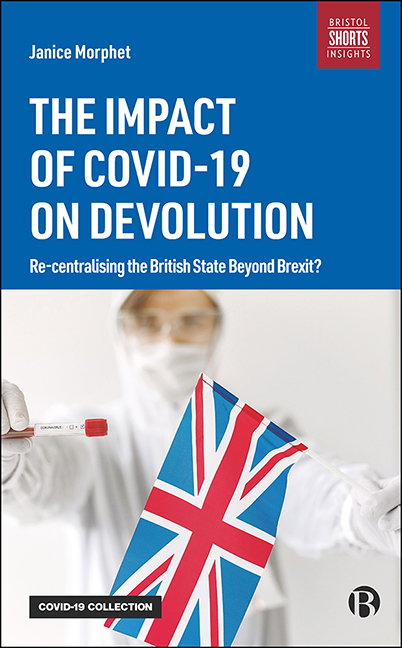Book contents
- Frontmatter
- Contents
- Preface
- List of Abbreviations
- one Devolution in the UK: The Twin Challenges of Brexit and COVID-19
- two Central Government, Brexit and COVID-19: Centralisation Through Privatisation?
- three The Role of the Devolved Nations in Meeting COVID-19
- four Getting to the Local: Managing the Pandemic in Practice
- five COVID-19 and a UK Unitary State Post-Brexit?
- References
- Index
Preface
Published online by Cambridge University Press: 04 January 2022
- Frontmatter
- Contents
- Preface
- List of Abbreviations
- one Devolution in the UK: The Twin Challenges of Brexit and COVID-19
- two Central Government, Brexit and COVID-19: Centralisation Through Privatisation?
- three The Role of the Devolved Nations in Meeting COVID-19
- four Getting to the Local: Managing the Pandemic in Practice
- five COVID-19 and a UK Unitary State Post-Brexit?
- References
- Index
Summary
Attempting to write a short book about COVID-19, Brexit and devolution when all are moving targets is a difficult proposition. The outcome from COVID-19 is as yet unknown, but what we see from the first moves to implement a mass vaccination programme replicates the centralised approaches used to manage the pandemic from its arrival in the UK in 2020, with a lack of transparency in how decisions are being made about who can be involved in making the jabs and how locations for vaccination have been selected. The weekly vaccination target numbers are given by the PM. But this time, the system has been operated, in plain sight, by the NHS not private contractors. The PM's popularity has increased through localism. Amidst this, the Trade Cooperation Agreement between the UK and the EU has been finalised and passed into law – except that it is hard to say that this is final – and there remain issues unresolved at the point of agreement, such as services, while other agreements will surely be changed as the experience of managing these agreed regimes become operational. What will the level playing field for regulation mean in practice? There may be political pressure for divergence but the business sector may lobby heavily to retain much of the pre-Brexit approach.
The opportunities for a post-Brexit evaluation of its effects on UK society may have to wait until we are in a post-COVID-19 world. This is when most people will start to experience the effects of the changes for travel and purchasing goods and services. There will also be a wider reckoning on the effects of the loss of the subsidiarity principle in GB – it still exists in Northern Ireland as part of the Protocol. The similarity of the two regimes on the island of Ireland and the differences between Northern Ireland and Scotland seem likely to exacerbate pressure for polls for reunification and independence, respectively. The economic benefits that Northern Ireland may gain from remaining within the EU will emphasise this widening difference.
The pandemic has also shown that the devolution settlement of the late 1990s failed to resolve the political and democratic leadership of England. Too often Westminster Ministers have talked about their UK policies when they have meant England.
- Type
- Chapter
- Information
- The Impact of COVID-19 on DevolutionRecentralising the British State beyond Brexit?, pp. vi - viiiPublisher: Bristol University PressPrint publication year: 2021



